So it appears my inaugural post on this blog might actually be about a rather mundane walk I did through Springleaf Gardens estate last December. This is perhaps appropriate, given what I wrote on my about this blog page. I’m not promising that all my walks will be exciting. In fact, if I were trying to send any kind of overarching message at all with this blog, it’s that boring, everyday spaces deserve our curiosity as well.
It was 30 December 2022, the final working day of the year, and I just happened to have the day off. The week so far had been a rainy one. I pleased to awaken that morning to see it bright and sunny. I decided I had to take the opportunity to go for a walk, even a relatively short one.
Springleaf Gardens is a private housing estate that began its development in the late 1970s. The streets making up the estate first appeared in the 1978 edition of the Singapore street map. As far as I can tell, development continued into the mid-1990s, with no major additions after that. It lies along Upper Thomson Road, but forms part of the Yishun planning area.
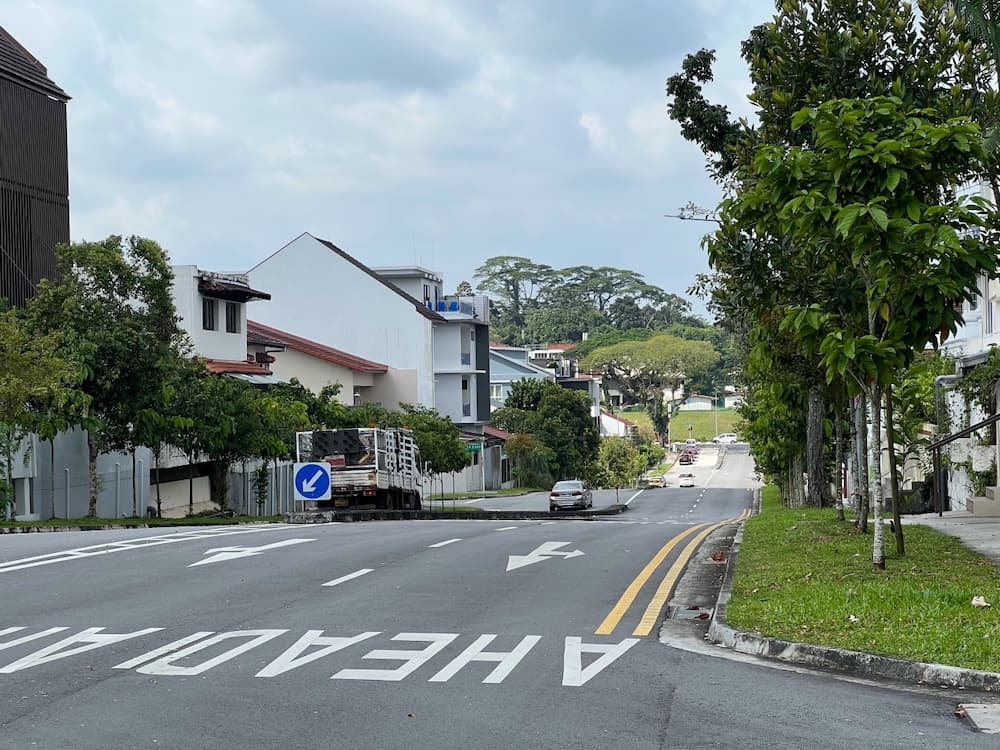
Springleaf Gardens estate
I started at Springleaf MRT station on the Thomson-East Coast line (TEL), opened just the last year. Many people stop here to visit the nearby Springleaf Nature Park or to sample the local cuisine. I eschewed both of these and instead headed off down Springleaf Road, beginning my walk around the estate. As I walked, I noticed two white-bellied sea eagles circling in the air above. It was a reminder how close this estate was to both Upper Seletar Reservoir in the west, and Lower Seletar Reservoir in the east.
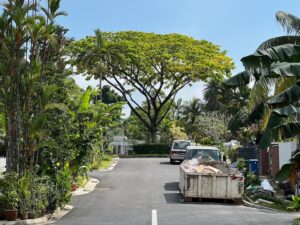
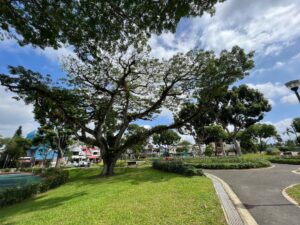
One thing that surprised me about the neighbourhood was how wide some of the streets were. Springleaf Road and Nee Soon Road, for example, had four lanes each. Nee Soon Road, at least, seems to have once been a major road in the area. It’s also much older than the rest of the estate, having appeared on maps as early as 1958. An article on The Straits Times in 1947 mentions the road as well.
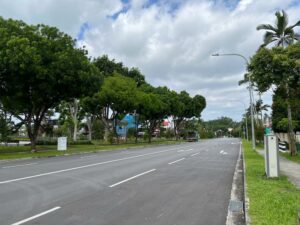
I was also struck by some of the architecture in the estate. Some might find them dated, but I found the arches and rounded corners on the houses along Springleaf Drive pleasing in their simplicity and consistency.
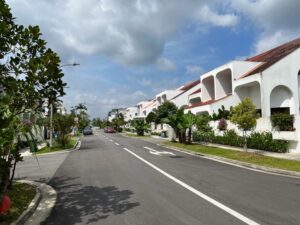
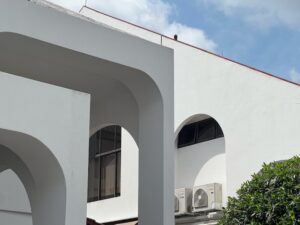
Springleaf Park Connector
I exited the estate by a footpath at Springleaf Avenue Playground, emerging onto Springleaf Park Connector. This park connector runs along Sungei Seletar, and connects Springleaf Nature Park on Upper Thomson Road to Lower Seletar Reservoir Park along Lentor Avenue.
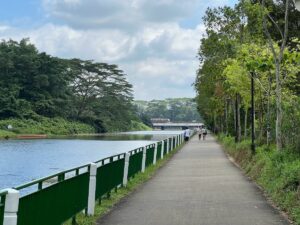
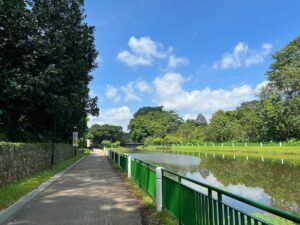
I spent a bit of time here looking for a geocache hidden on an observation deck along the river, then continued on my way towards Upper Thomson Road. I turned back into Springleaf Gardens and circled back to Nee Soon Road via Springleaf Avenue, following Nee Soon Road to near its conclusion at Springleaf Nature Park. From there, I followed Upper Thomson Road up to where it morphs into Sembawang Road, and turned into Springside estate.
Springside estate
Slightly younger than its next-door sibling, Springside estate seems to have been developed only in the late 1990s to early 2000s. The streets making up the estate first appeared in the 1998 edition of the Singapore street map, but were listed then as being under construction.
To be honest, I found the houses in this estate somewhat less impressive. Perhaps time will lend them some character, where their architecture, IMO, does not.
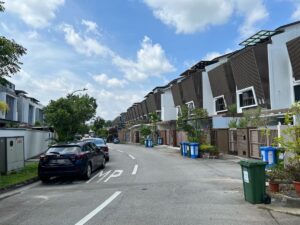
I ended my walk at Springside Park, back along Sembawang Road. Here, a large mobile phone antenna mast rose out of the ground, disguised as a tree, a bit of a neighbourhood landmark.
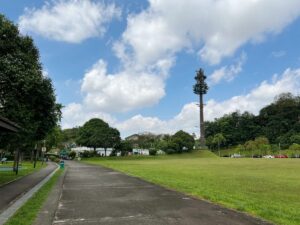
Walk details
- Date: Friday, 30 December 2022
- Distance: 7.5km
- Time taken: 1 hour 23 minutes
- Accessibility: Almost fully paved throughout. Road walking may be necessary along narrow residential streets. A few vertical curbs which may require detours. Footpath from Thong Soon Avenue onto Springleaf Road may not be accessible due to uneven, grassy footpath. Consider a detour along Thong Soon Road instead. (This route was walked before I knew I was going to blog about it. Please see my accessibility statement)
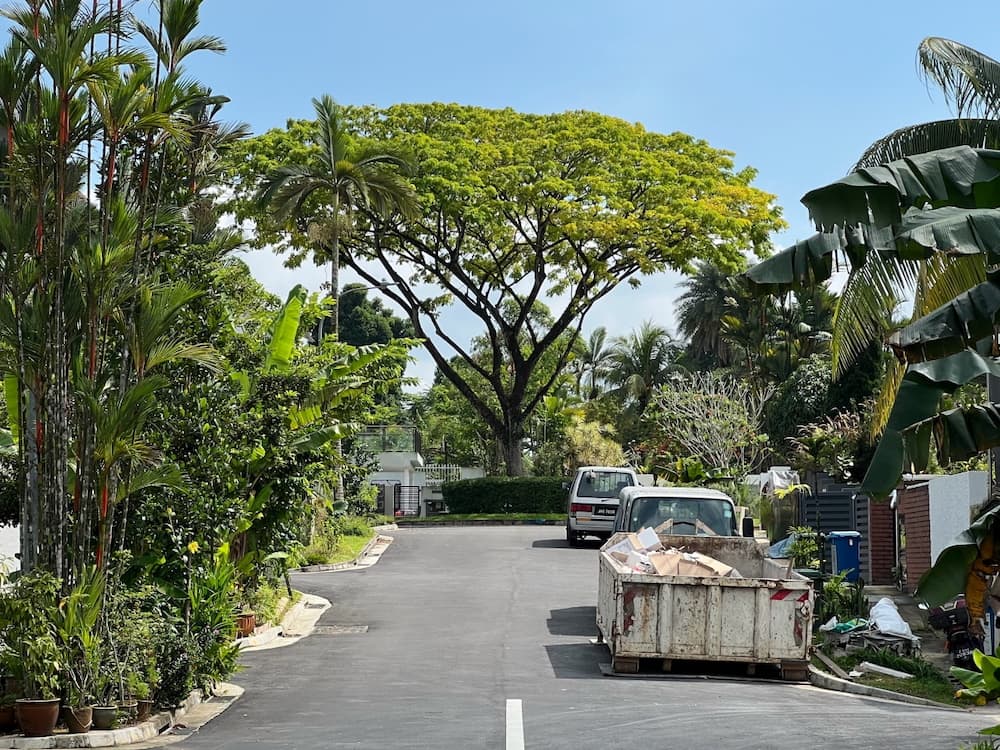
Leave a Reply